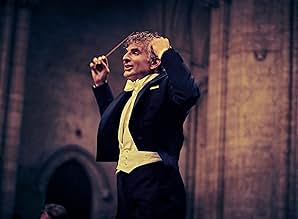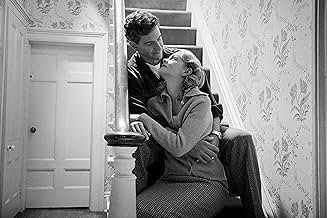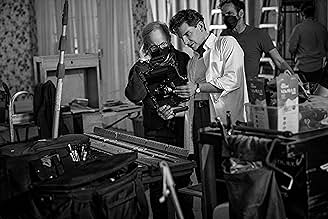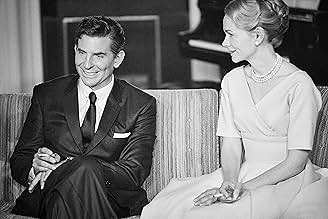Diese Liebesgeschichte schildert die lebenslange Beziehung zwischen dem Dirigenten und Komponisten Leonard Bernstein und Felicia Montealegre Cohn Bernstein.Diese Liebesgeschichte schildert die lebenslange Beziehung zwischen dem Dirigenten und Komponisten Leonard Bernstein und Felicia Montealegre Cohn Bernstein.Diese Liebesgeschichte schildert die lebenslange Beziehung zwischen dem Dirigenten und Komponisten Leonard Bernstein und Felicia Montealegre Cohn Bernstein.
- Regie
- Drehbuch
- Hauptbesetzung
- Für 7 Oscars nominiert
- 27 Gewinne & 180 Nominierungen insgesamt
Empfohlene Bewertungen
The acting is superb and particularly Carey Mulligan who is astonishing, as usual, and Bradley Cooper's transformation is incredible. The look and feel throughout is very polished. But, and this isn't a minor quibble -- I found it really hard to understand the dialogue! Characters speak so quickly, in a mumble, that I actually considered putting on subtitles. Anyway, it wouldn't have made a difference, I thought the movie was so empty and plotless and uninteresting. There was really no tension in the wife's dealing with her husband's bisexuality, no real exploration or understanding of Bernstein's conflicts, and no delving into his achievements or their context, so there wasn't much left!
A struggling musician agonized by his own genius, talents, and creativity and trapped in loveless marriage filled with guilt. Both look the other way while one has an affair and realize the importance of one's own partner too late. Right now, at the top of my head I can think of 'Fosse/Verdon', 'A Star Is Born', 'George & Tammy', 'Walk the Line', 'Dreamgirls', 'Daisy Jones & The Six', and etc. (Wow, that's a lot.) Biographical genre is especially tricky because it has to excel the life of actual historical figures. 'Maestro' could have been so much better if it delved into the introspective and artistic side of Bernstein deeper or provided a different and fresh point of view on his life rather than reciting his personal life. His autobiography or research would be more fun and interesting than this explanatory movie.
There were a few futile attempts to make the movie look more artistic, abstract, and ambiguous. They failed because they serve no purpose but to look pretentious. White and black, camera movement, the use of light and shadows, and musical aspects. They are all good attempts, but for what? By doing so, is the story getting stronger? Do they enhance what viewers feel? Waste of time and films.
Bradley Cooper's performance is disappointing. He never acts; he imitates. When he's on the screen, we know clearly that he's acting. It's hard to be absorbed and immersed into the screen because he always pushes the audience away with his trying too hard. I get that he wants to emulate Bernstein's twangy voice. However, emotions and messages he delivers are more important than his likeness of Bernstein's tone, accent, sound, or mannerism. He focuses on what's outside of Bernstein rather than what would be inside of him. There is a 10 minute sequence of Cooper conducting, and it's screaming 'Look how good I am!!!'. It's one of the highest points for emotions to burst out for the audience, and I started to laugh.
There were a few futile attempts to make the movie look more artistic, abstract, and ambiguous. They failed because they serve no purpose but to look pretentious. White and black, camera movement, the use of light and shadows, and musical aspects. They are all good attempts, but for what? By doing so, is the story getting stronger? Do they enhance what viewers feel? Waste of time and films.
Bradley Cooper's performance is disappointing. He never acts; he imitates. When he's on the screen, we know clearly that he's acting. It's hard to be absorbed and immersed into the screen because he always pushes the audience away with his trying too hard. I get that he wants to emulate Bernstein's twangy voice. However, emotions and messages he delivers are more important than his likeness of Bernstein's tone, accent, sound, or mannerism. He focuses on what's outside of Bernstein rather than what would be inside of him. There is a 10 minute sequence of Cooper conducting, and it's screaming 'Look how good I am!!!'. It's one of the highest points for emotions to burst out for the audience, and I started to laugh.
I went to Maestro expecting a film that would chronicle the life of one of America's, if not the world's, great composer/conductors. I've seen Leonard Bernstein many, many times, starting at age 8 when my grandfather took me to Bernstein's music for kids on Saturday mornings at Lincoln Center. I had no idea who he was at the time, only that people called him Lenny. My grandpa took me to meet him and he was spellbinding. I remember him looking right threw me with his expressive eyes.
He loved kids and loved to teach them about music. Turns out grandpa and Lenny went to Harvard together, hence I got a personal introduction. Bernstein is the guy that got me hooked on classical music and music in general, but I didn't learn anything about his musical career, his childhood, his years at Harvard, his work in Europe, who inspired him, etc.
The making of West Side Story is really interesting (if you know the story) but nothing about it in this film and I mean "nothing.; We get a tiny glimpse of Candide, but nothing about its composition or insight into the Maestro's process. We get zero insight into his Missa Brevis, perhaps on the highlights of his career.
Bradley Cooper blew me away. I've seen Lenny up close many times and I've talked to him a few times. Cooper nailed it, and the scene at St John of the Divine is probably one of the greatest musical scenes ever captured on film. Cooper's conducting is simply amazing. He worked very very hard to capture the speech, mannerisms, and the Bernstein attitude and texture toward music. I cannot speak highly enough of Cooper's performance, but we get so little insight into the musician, and that was so disappointing.
Carey Mulligan? Her performance is nothing less than spectacular, in fact all the acting is extraordinary, but it's not a story. The Bernstein children really have nothing to do in this film, and I have no idea why Lenny's sister was included as she has very little to say or do. Overall, a very perplexing film ... not sure what he was going for. In fact, I kept waiting for it to start. The emphasis was all on style, and believe me, it's beautiful to look at.
He loved kids and loved to teach them about music. Turns out grandpa and Lenny went to Harvard together, hence I got a personal introduction. Bernstein is the guy that got me hooked on classical music and music in general, but I didn't learn anything about his musical career, his childhood, his years at Harvard, his work in Europe, who inspired him, etc.
The making of West Side Story is really interesting (if you know the story) but nothing about it in this film and I mean "nothing.; We get a tiny glimpse of Candide, but nothing about its composition or insight into the Maestro's process. We get zero insight into his Missa Brevis, perhaps on the highlights of his career.
Bradley Cooper blew me away. I've seen Lenny up close many times and I've talked to him a few times. Cooper nailed it, and the scene at St John of the Divine is probably one of the greatest musical scenes ever captured on film. Cooper's conducting is simply amazing. He worked very very hard to capture the speech, mannerisms, and the Bernstein attitude and texture toward music. I cannot speak highly enough of Cooper's performance, but we get so little insight into the musician, and that was so disappointing.
Carey Mulligan? Her performance is nothing less than spectacular, in fact all the acting is extraordinary, but it's not a story. The Bernstein children really have nothing to do in this film, and I have no idea why Lenny's sister was included as she has very little to say or do. Overall, a very perplexing film ... not sure what he was going for. In fact, I kept waiting for it to start. The emphasis was all on style, and believe me, it's beautiful to look at.
It's an old (and unanswerable) question: to what extent is it possible - or desirable - to separate the art from the artist? Is it possible to appreciate the art simply as art, and not to delve into the (sometimes tawdry) details of the artist? Or are the art and the artist so inextricably entwined that you cannot understand the one without knowing the other?
I very much lean towards separation. I fell in love with Bernstein's music the first time I saw West Side Story mumble years ago at an impressionable age; which is why I was disappointed that there was so little West Side Story in this film. Surely a biopic of a composer should feature that composer's music pretty heavily?
Of course, we all know that beneath every great artist is a human being - usually with a collection of human flaws. But does this matter? Well, it matters here. What we mostly get is a film about Leonard the man, and his complicated marriage to Felicia Montealegre. Much of this was new to me. I knew that Bernstein was bisexual, but didn't care. I find that I also don't care about most of the other details of his life which were revealed to me - although if the film was truly about the man, not his music, his record as a human rights activist should probably have been at least touched on. But never mind that: I came for the music, and didn't get enough.
Not that this film is without merit. Bradley Cooper's performance is first class - there's one sequence in which he truly shows us the passion of a great conductor - and Carey Mulligan is as riveting as ever. Cinematography and sound are both excellent.
Overall, this is a good film, but ultimately a disappointing one.
I very much lean towards separation. I fell in love with Bernstein's music the first time I saw West Side Story mumble years ago at an impressionable age; which is why I was disappointed that there was so little West Side Story in this film. Surely a biopic of a composer should feature that composer's music pretty heavily?
Of course, we all know that beneath every great artist is a human being - usually with a collection of human flaws. But does this matter? Well, it matters here. What we mostly get is a film about Leonard the man, and his complicated marriage to Felicia Montealegre. Much of this was new to me. I knew that Bernstein was bisexual, but didn't care. I find that I also don't care about most of the other details of his life which were revealed to me - although if the film was truly about the man, not his music, his record as a human rights activist should probably have been at least touched on. But never mind that: I came for the music, and didn't get enough.
Not that this film is without merit. Bradley Cooper's performance is first class - there's one sequence in which he truly shows us the passion of a great conductor - and Carey Mulligan is as riveting as ever. Cinematography and sound are both excellent.
Overall, this is a good film, but ultimately a disappointing one.
We don't know much about Leonard Bernstein. We didn't learn why he wanted to be a composer or how he got in the business. His relationship wasn't very clear either. He's bisexual, but that doesn't go anywhere. His wife isn't explained much either other than being a stage actress. We don't know much about his children. The timelines aren't clear when the movie takes place. It seems to start in the 50s other than the opening scene of him as an old man. I do like Bradley Cooper's performance, but not much comes from the character. We don't know what made him famous since he was already famous before his memorable score in On the Waterfront.
Wusstest du schon
- WissenswertesOf the scene in which Leonard Bernstein conducts the London Symphony Orchestra at the Ely Cathedral in 1976, Bradley Cooper said, "That scene I was so worried about because we did it live... I was recorded live. I had to conduct them. And I spent six years learning how to conduct six minutes and 21 seconds of music. I was able to get the raw take where I just watched Leonard Bernstein [conduct] at Ely Cathedral... And so I had that to study."
- PatzerThe day after Bernstein makes his wildly successful debut with the N.Y. Philharmonic in November of 1943, the story is carried on the front page of the N.Y. Times. One of his friends notes that the front page also includes a headline reading "Hitler Bombs Poland." Germany had bombed and conquered Poland in September, 1939, so the country had already been under German occupation for over four years at the time of Bernstein's debut concert.
- Zitate
Leonard Bernstein: Summer sang in me a little while, it sings in me no more. Edna St. Vincent Millay.
Felicia Montealegre: If the summer doesn't sing in you, then nothing sings in you. And if nothing sings in you, then you can't make music.
- VerbindungenFeatured in Chris Plante: The Right Squad: Folge #1.70 (2023)
Top-Auswahl
Melde dich zum Bewerten an und greife auf die Watchlist für personalisierte Empfehlungen zu.
- How long is Maestro?Powered by Alexa
Details
- Erscheinungsdatum
- Herkunftsländer
- Offizieller Standort
- Sprache
- Auch bekannt als
- Rybernia
- Drehorte
- Produktionsfirmen
- Weitere beteiligte Unternehmen bei IMDbPro anzeigen
Box Office
- Budget
- 80.000.000 $ (geschätzt)
- Weltweiter Bruttoertrag
- 383.532 $
- Laufzeit
- 2 Std. 9 Min.(129 min)
- Farbe
- Sound-Mix
- Seitenverhältnis
- 1.33 : 1
Zu dieser Seite beitragen
Bearbeitung vorschlagen oder fehlenden Inhalt hinzufügen










































